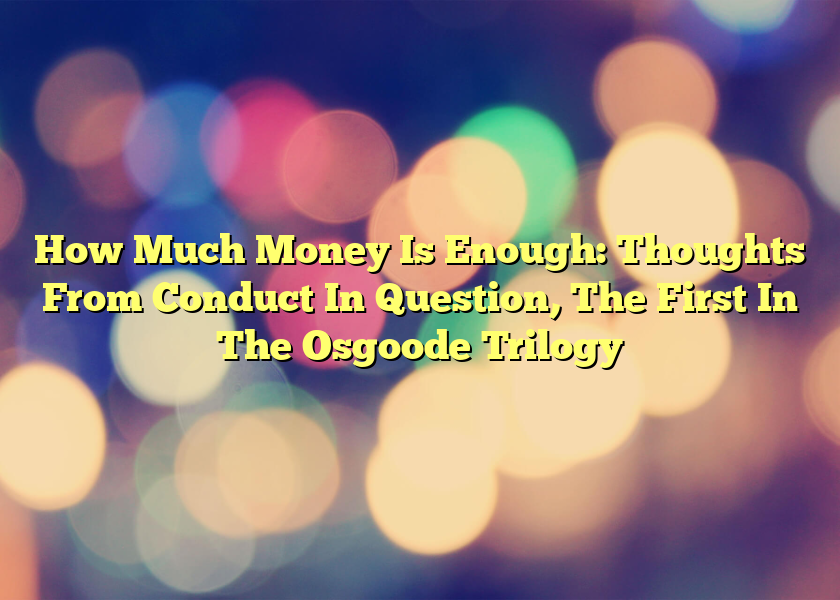How Much Money Is Enough: Thoughts From Conduct In Question, The First In The Osgoode Trilogy
Ever had your moral convictions put to the test? Most of us think we know what we’d do in any given situation. But do we really? Maybe another unknown part of us surfaces and takes over—leaving us in a confusion of questions. But the deed is done and we cannot take it back.
This is the predicament, Harry Jenkins, protagonist/lawyer of The Osgoode Trilogy finds himself in, at the beginning of the first novel, Conduct in Question. Harry longs for freedom and love, but has been trapped under his senior partner’s thumb and in a dead marriage for years. He’s always been certain of his own moral convictions, but when his partner drops dead in the office, Harry is free to make his own mistakes.
He and his wife Laura often argue about money.
—a topic fraught with land mines. Her hardened face floated up in his mind.
“Law practice is more than just making money,” Harry had insisted.
“Of course!” she said in wearily impatient tones. “But it certainly doesn’t hurt to set the right value on your services.”
“So I’m not making enough. Is that it?”
“No. But if you didn’t get so personally involved with your clients, maybe you’d do better.”
Harry was astonished. “So I care too much about them? I care about what I’m doing?”… “Clients trust me! I’ve earned that. I can’t turn around and fleece them.”
Although not satisfied with life, Harry—
had learned his lessons well. He had kept his part of the bargain. But where was his reward? Flashy cars and grandiose houses were the supposed perks of his profession. His Ford was surrounded by Audis. Playing by the rules had not gotten him far. Of course, he wasn’t poor. Laura and he were comfortable. Yet, there was a yearning, a sense that the time for making real money was passing. But it wasn’t just the money. A dull emptiness nagged at his spirit.
And so, he is ripe for the picking! Almost immediately, he is swept into a massive money-laundering scheme by the enigmatic Mr. Chin — land developer — thereby putting him in direct conflict with his oldest and wealthiest client, Marjorie Deighton. With Albert Chin’s huge retainer check for work to be done, Harry senses something is amiss. When he deposits the check in the bank, the manager demands he make a payment on his deceased partner’s very substantial and overdue bank loan. Otherwise, he will freeze the Chin money. In a dilemma, Harry is forced to use the Chin retainer to make a payment.
Harry was scrupulous about client funds, and would fret if the bookkeeper missed a penny. Snatching up his check book, he saw in his mind the bright and trusting faces of a hundred clients. He saw those faces turn gray in disbelief when he uncapped his pen.
Petty triumph gleamed in Mudhali’s eyes.
Despite years of circumspection and care, Harry was driven by a new and reckless fury. Either he made a payment, or the bank would freeze his accounts. Mudhali had nailed him to the wall.
Like most of us, Harry is good at justifying his actions.
Albert Chin had said that money was no problem, and after all, there was lots of work in preparing those offers. He would search the titles to the properties, do the corporate searches, and prepare six offers and submit them. Surely that would add up to twenty-five grand. Besides, Chin would not have given him such a munificent retainer had he not expected a sizable bill. And Harry knew that he was not the only lawyer guilty of such an infraction.
What does Harry do? After all, he may be our hero, but he’s a pretty human guy. Despite his instincts and better judgment, he turns a blind eye to obvious signs of danger and accepts Mr. Chin’s gifts.
Harry withdrew two first-class tickets for flights and a voucher for a three-night stay in a luxury suite in Nassau. “The Atlantis Resort,” he whispered. Shimmering blue waters danced before his mind’s eye.
After a moment, he said, “This is more than kind of you, sir, but—”
Mr. Chin held up his hand. “Please. The conglomerate wishes to express its gratitude for your most timely service. We know you have made room for us in your busy schedule.”
“But surely not. The retainer is very substantial, and…” He fingered the brochure, which featured a photograph of sunny beaches and gently lapping water.
And so, much of Conduct in Question is about Harry trying to extricate himself from the clutches of Mr. Chin. But Harry has lots of other problems to contend with when he comes face to face with the nature of evil in tracking down the Florist, a sadistic killer with an artistic flair who believes he is called to judge the worthiness of his victims. But that story is for another day!
